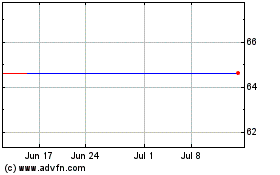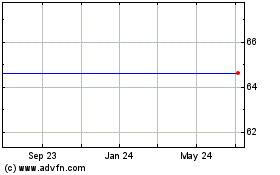BOE's Weale Shifts Stance on Stimulus Following Brexit Impact
July 26 2016 - 4:30AM
Dow Jones News
Bank of England rate setter Martin Weale has signaled he will
now vote in favor of providing fresh stimulus for the U.K. economy,
a change of stance prompted by a survey of purchasing managers
released Friday that pointed to a decline in activity in the wake
of Britons' vote to leave the European Union.
The gathering of the Monetary Policy Committee's nine members
Aug. 2 and Aug. 3 will be Mr. Weale's last, after serving two
three-year terms. In a speech in mid-July, Mr. Weale said he wasn't
convinced that a cut in the key interest rate was needed in the
wake of the June 23 vote to leave the bloc.
But the release of the composite Purchasing Managers Index has
changed his understanding of the immediate economic impact of the
vote.
Data firm IHS Markit said the measure of private-sector activity
fell sharply to its lowest level since early 2009, when the global
economy was in the throes of a steep downturn following the onset
of the financial crisis. The composite PMI's decline to 47.7 in
July from 52.4 in June was the sharpest one-month drop on record. A
reading below 50.0 signals a decline in activity, and a reading
above that level indicates an expansion.
"They are the best short-term indicator we have at the moment. I
certainly feel they are very material for the decision we'll be
taking next week," Mr. Weale said in an interview with the
Financial Times, adding that the PMI was "a lot worse than I had
thought" and showed "expectations have worsened sharply".
Mr. Weale's change of heart leaves only one MPC member having
expressed a reluctance to vote for more stimulus at the August
meeting. Writing for the Daily Telegraph newspaper last week,
Kristin Forbes said the uncertainty facing businesses in the wake
of the vote will likely slow economic growth, but added that it
will take time to judge the scale of the impact and that it was
therefore better to wait for more evidence before making a
move.
The BOE has already taken some action to support growth in the
aftermath of the referendum by easing regulatory restraints on U.K.
banks in a push aimed at allowing them to lend an extra £ 150
billion to U.K. businesses and households. The move reduced the
amount of capital banks must hold against loan portfolios.
The BOE sent a strong signal this month that it intends to cut
interest rates in August, saying "most members" of the MPC expected
to support a package of measures aimed at supporting the economy.
In a speech delivered shortly after the result of the referendum
became known, BOE Gov. Mark Carney said it was his personal view
that more stimulus would be needed.
BOE Chief Economist Andrew Haldane has also indicated that he
will vote for more stimulus, while fellow MPC member Gertjan
Vlieghe voted for a cut in the key interest rate in July and is
very likely to do so again.
Economists say a cut in the key interest rate to 0.25% from the
current, record low of 0.5% is the most likely form of stimulus to
be provided by the MPC. Other options include an expansion of the
central bank's bond-buying program, which is known as quantitative
easing and was last increased in July 2012.
"Asset purchases are still likely to be effective," Mr. Weale
said.
Write to Paul Hannon at paul.hannon@wsj.com
(END) Dow Jones Newswires
July 26, 2016 04:15 ET (08:15 GMT)
Copyright (c) 2016 Dow Jones & Company, Inc.
IHS Markit Ltd. (NASDAQ:INFO)
Historical Stock Chart
From Mar 2024 to Apr 2024

IHS Markit Ltd. (NASDAQ:INFO)
Historical Stock Chart
From Apr 2023 to Apr 2024
